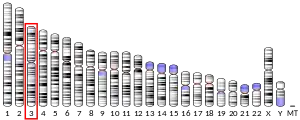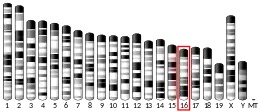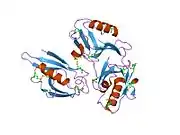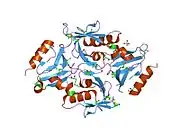DVL3
Segment polarity protein dishevelled homolog DVL-3 is a protein that in humans is encoded by the DVL3 gene.[5][6]
This gene is a member of a multi-gene family which shares strong similarity with the Drosophila dishevelled gene, dsh. The Drosophila dishevelled gene encodes a cytoplasmic phosphoprotein that regulates cell proliferation.[6]
See also
References
- GRCh38: Ensembl release 89: ENSG00000161202 - Ensembl, May 2017
- GRCm38: Ensembl release 89: ENSMUSG00000003233 - Ensembl, May 2017
- "Human PubMed Reference:". National Center for Biotechnology Information, U.S. National Library of Medicine.
- "Mouse PubMed Reference:". National Center for Biotechnology Information, U.S. National Library of Medicine.
- Pizzuti A, Amati F, Calabrese G, Mari A, Colosimo A, Silani V, Giardino L, Ratti A, Penso D, Calza L, Palka G, Scarlato G, Novelli G, Dallapiccola B (January 1997). "cDNA characterization and chromosomal mapping of two human homologues of the Drosophila dishevelled polarity gene". Hum Mol Genet. 5 (7): 953–958. doi:10.1093/hmg/5.7.953. PMID 8817329.
- "Entrez Gene: DVL3 dishevelled, dsh homolog 3 (Drosophila)".
- Hocevar, B A; Mou F; Rennolds J L; Morris S M; Cooper J A; Howe P H (June 2003). "Regulation of the Wnt signaling pathway by disabled-2 (Dab2)". EMBO J. England. 22 (12): 3084–3094. doi:10.1093/emboj/cdg286. ISSN 0261-4189. PMC 162138. PMID 12805222.
- Kishida, S; Yamamoto H; Hino S; Ikeda S; Kishida M; Kikuchi A (June 1999). "DIX domains of Dvl and axin are necessary for protein interactions and their ability to regulate beta-catenin stability". Mol. Cell. Biol. UNITED STATES. 19 (6): 4414–4422. doi:10.1128/mcb.19.6.4414. ISSN 0270-7306. PMC 104400. PMID 10330181.
- Rual, Jean-François; Venkatesan Kavitha; Hao Tong; Hirozane-Kishikawa Tomoko; Dricot Amélie; Li Ning; Berriz Gabriel F; Gibbons Francis D; Dreze Matija; Ayivi-Guedehoussou Nono; Klitgord Niels; Simon Christophe; Boxem Mike; Milstein Stuart; Rosenberg Jennifer; Goldberg Debra S; Zhang Lan V; Wong Sharyl L; Franklin Giovanni; Li Siming; Albala Joanna S; Lim Janghoo; Fraughton Carlene; Llamosas Estelle; Cevik Sebiha; Bex Camille; Lamesch Philippe; Sikorski Robert S; Vandenhaute Jean; Zoghbi Huda Y; Smolyar Alex; Bosak Stephanie; Sequerra Reynaldo; Doucette-Stamm Lynn; Cusick Michael E; Hill David E; Roth Frederick P; Vidal Marc (October 2005). "Towards a proteome-scale map of the human protein-protein interaction network". Nature. England. 437 (7062): 1173–1178. Bibcode:2005Natur.437.1173R. doi:10.1038/nature04209. PMID 16189514. S2CID 4427026.
Further reading
- Nagase T, Seki N, Ishikawa K, et al. (1997). "Prediction of the coding sequences of unidentified human genes. VI. The coding sequences of 80 new genes (KIAA0201-KIAA0280) deduced by analysis of cDNA clones from cell line KG-1 and brain". DNA Res. 3 (5): 321–329, 341–54. doi:10.1093/dnares/3.5.321. PMID 9039502.
- Semënov MV, Snyder M (1997). "Human dishevelled genes constitute a DHR-containing multigene family". Genomics. 42 (2): 302–310. doi:10.1006/geno.1997.4713. PMID 9192851.
- Bui TD, Beier DR, Jonssen M, et al. (1997). "cDNA cloning of a human dishevelled DVL-3 gene, mapping to 3q27, and expression in human breast and colon carcinomas". Biochem. Biophys. Res. Commun. 239 (2): 510–516. doi:10.1006/bbrc.1997.7500. PMID 9344861.
- Kishida S, Yamamoto H, Hino S, et al. (1999). "DIX domains of Dvl and axin are necessary for protein interactions and their ability to regulate beta-catenin stability". Mol. Cell. Biol. 19 (6): 4414–4422. doi:10.1128/mcb.19.6.4414. PMC 104400. PMID 10330181.
- Song DH, Sussman DJ, Seldin DC (2000). "Endogenous protein kinase CK2 participates in Wnt signaling in mammary epithelial cells". J. Biol. Chem. 275 (31): 23790–23797. doi:10.1074/jbc.M909107199. PMID 10806215.
- Strausberg RL, Feingold EA, Grouse LH, et al. (2003). "Generation and initial analysis of more than 15,000 full-length human and mouse cDNA sequences". Proc. Natl. Acad. Sci. U.S.A. 99 (26): 16899–16903. Bibcode:2002PNAS...9916899M. doi:10.1073/pnas.242603899. PMC 139241. PMID 12477932.
- Hocevar BA, Mou F, Rennolds JL, et al. (2003). "Regulation of the Wnt signaling pathway by disabled-2 (Dab2)". EMBO J. 22 (12): 3084–3094. doi:10.1093/emboj/cdg286. PMC 162138. PMID 12805222.
- Ota T, Suzuki Y, Nishikawa T, et al. (2004). "Complete sequencing and characterization of 21,243 full-length human cDNAs". Nat. Genet. 36 (1): 40–45. doi:10.1038/ng1285. PMID 14702039.
- Torban E, Wang HJ, Groulx N, Gros P (2005). "Independent mutations in mouse Vangl2 that cause neural tube defects in looptail mice impair interaction with members of the Dishevelled family". J. Biol. Chem. 279 (50): 52703–52713. doi:10.1074/jbc.M408675200. PMID 15456783.
- Gerhard DS, Wagner L, Feingold EA, et al. (2004). "The status, quality, and expansion of the NIH full-length cDNA project: the Mammalian Gene Collection (MGC)". Genome Res. 14 (10B): 2121–2127. doi:10.1101/gr.2596504. PMC 528928. PMID 15489334.
- Rual JF, Venkatesan K, Hao T, et al. (2005). "Towards a proteome-scale map of the human protein-protein interaction network". Nature. 437 (7062): 1173–1178. Bibcode:2005Natur.437.1173R. doi:10.1038/nature04209. PMID 16189514. S2CID 4427026.
- Chan DW, Chan CY, Yam JW, et al. (2006). "Prickle-1 negatively regulates Wnt/beta-catenin pathway by promoting Dishevelled ubiquitination/degradation in liver cancer". Gastroenterology. 131 (4): 1218–1227. doi:10.1053/j.gastro.2006.07.020. PMID 17030191.
This article is issued from Wikipedia. The text is licensed under Creative Commons - Attribution - Sharealike. Additional terms may apply for the media files.







